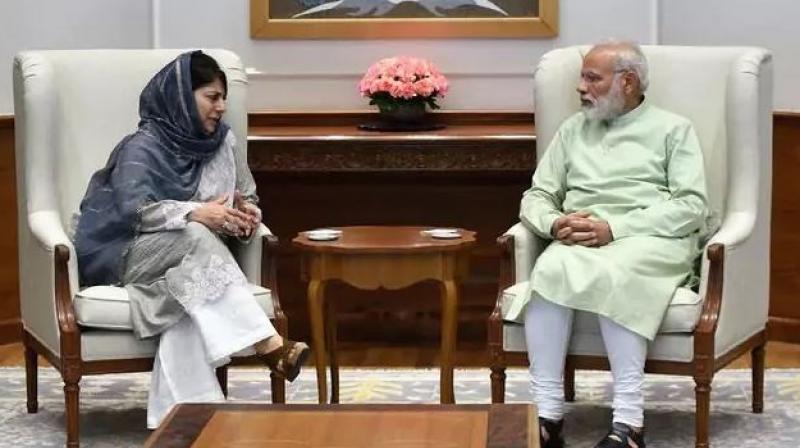Alliance with Mufti's PDP in Jammu & Kashmir was untenable, says BJP
Soon after the announcement CM Mehbooba Mufti handed in her resignation, prompting the way for Governor's Rule, which the BJP favours.

New Delhi: The Bharatiya Janata Party (BJP) pulled out of its alliance with Mehbooba Mufti’s People’s Democratic Party (PDP) on Tuesday, ending a three-year rocky relationship that came to a flashpoint this week with the Centre’s decision to discontinue the Ramzan ceasefire in Jammu and Kashmir.
Untenable, the BJP called the alliance, blaming the government for the rise in violence in the Valley.
BJP general secretary Ram Madhav told the media: “We have taken a decision. It is untenable for the BJP to continue in alliance with the PDP in Jammu and Kashmir. Hence, we are withdrawing support.”
He added: “Terrorism, violence and radicalisation have risen and fundamental rights of citizens are in danger in the Valley. Shujaat Bukhari’s killing is an example.”
Madhav also cited the lack of development in Jammu and Ladakh.
Also Read: Muscular security policy will not work in J&K, says Mehbooba Mufti
Party president Amit Shah had called all BJP lawmakers in the state to Delhi for a meeting in the morning. Madhav said the brainstorming was to review the alliance's goals and targets achieved in the last three years.
Soon after the announcement Chief Minister Mehbooba Mufti handed in her resignation, prompting the way for Governor's Rule, which the BJP favours.
Jammu and Kashmir BJP lawmakers welcomed the Centre's decision to pull out from the PDP alliance. They also tendered their resignation to Jammu and Kashmir Chief Minister Mehbooba Mufti.
Jammu Kashmir Deputy CM Kavinder Gupta said, "We have submitted our resignations to CM Mufti. We have now come out of the government."
The BJP had 25 lawmakers and the PDP 28 in the state Assembly, where the majority mark is 45. The National Confrence has 15, the Congress 12 and others 7 MLAs in the state Assembly.
Also Read: No question of alliance with PDP, says Cong's Ghulam Nabi Azad
BJP and the PDP, unlikely partners from the onset of their alliance, have had uneasy relations from time to time in the last three years. Things came to a head on Sunday when Union Home Minister Rajnath Singh lifted the ceasefire that the government had put in force during the month of Ramzan. Anti-terror operations would resume in full force, Singh said on Sunday.
Data shows terrorist activity had more than doubled in this month.
The killing of Rising Kashmir editor and a moderate voice Shujaat Bukhari was the last nail in PDP’s hopes that the ceasefire would continue to promote harmony in the Valley.
The ceasefire was Chief Minister Mehbooba Mufti’s brainchild, though it had met stiff opposition from the state BJP.
Sources in Mufti’s Peoples’ Democratic Party (PDP) said that after deciding not to extend the conditional ceasefire announced by the Centre for the Islamic fasting month of Ramzan, the Modi government has decided to launch a tough military campaign against separatist militants in the restive state and give a ‘free hand’ to security forces to deal with the situation. The PDP did not agree to it which established the point of no return.
The Chief Minister and the PDP had also pleaded for extending the Ramzan truce beyond Eid-ul-Fitr to pave the way for holding talks with the separatists which was ignored by the Centre, the sources said.
However, sections of security forces and also senior Army commanders were against extending Ramzan ceasefire and even eager not only to resume but also bump up anti-militant and anti-terror operations across the Kashmir Valley at earliest. They were planning to launch ‘Operation All Out II’ against the militants. In its first phase, more than three hundred militants, including several top commanders, were killed in 2017 and during the first four and half months of 2018.
Local watchers see in the BJP’s decision also an attempt to charm its constituency as the party was being openly accused of surrendering for power the interests of Jammu from where it won almost all seats in the 2014 Assembly election. On the other hand, the PDP’s support base in Kashmir Valley has eroded because it chose the saffron party as its ally, and because of the unending killings in the Valley over the last three years.
Ever since the two parties cobbled up an alliance to form the government in 2015, they have publicly differed on issues including Article 370 which guarantees special status to J&K within the Indian Union. While the PDP would repeatedly say it will never allow dilution of this provision, the BJP would vow that abrogation of Article 370 and its upshot including Article 35A are ‘core agendas’ of the party and that it could never abandon it. “Only for the purposes of running a coalition government in the state, the party had decided not to press for abrogation of Article 370 while in government. The agenda is not abandoned,” the party would say.
Tension had also simmered over the PDP’s promise to talk to separatists, the proposal to remove the Armed Forces’ Special Powers Act (AFSPA) which gives the Army more power in insurgent areas and even in the rollout of the Goods and Services tax in the state.
This March, the PDP sacked its minister Haseeb Drabu who was a popular interlocutor between the allies.
National Conference leader and former chief minister of Jammu and Kashmir Omar Abdullah tweeted after Tuesday's fallout.
And so it has come to pass........
— Omar Abdullah (@OmarAbdullah) June 19, 2018
Senior Congress leader Kapil Sibal also took to Twitter and called the BJP an "opportunistic party".
An opportunistic BJP
— Kapil Sibal (@KapilSibal) June 19, 2018
First an opportunistic alliance with PDP
Now an opportunistic breakaway
Both acts of political immorality
Kaise Desh badlega ?

